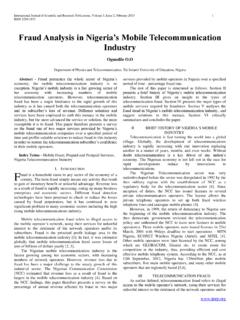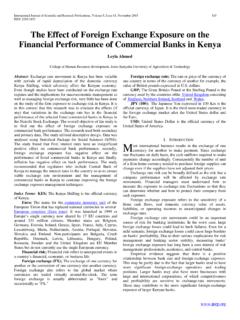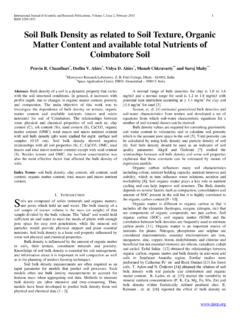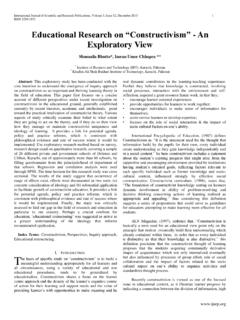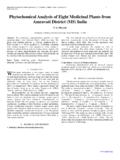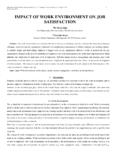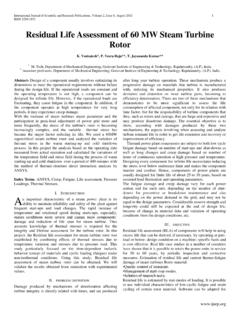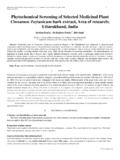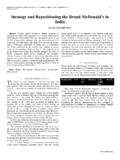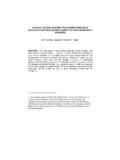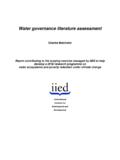Transcription of Factors Affecting Foreign Direct Investment Decisions ...
1 International Journal of Scientific and Research Publications, Volume 5, Issue 9, September 2015 1 ISSN 2250-3153 Factors Affecting Foreign Direct Investment Decisions Among International Companies Investing In Kenya: A Case Study Of Coca Cola Bottlers Mombasa Anne Wangui Muya, Dr. Fred Mugambi Jomo Kenyatta University of Agriculture and technology , Box 81310-80100 Mombasa Abstract- Foreign Direct Investment (FDI) plays a crucial role to speed up the development and economic growth of a country. In particular, developing countries rely heavily on FDI to promote their economy as they face capital shortage for their development process. FDI not only brings in capitals and technology, but also skills into developing countries. And this end is to help the countries grow faster by satisfying the country s needs.
2 The main aim of this study is to explore and determine the Factors Affecting Foreign Direct Investment Decisions among International companies investing in Kenya, find ways in which (FDI) Foreign Direct Investment contributes to the development of Kenyan economy and finally to determine the strategies to attract and retain Foreign Direct investments in Kenya. The study analysed critically both the theoretical and empirical reviews of the available data before conducting the study to ensure the viability of the study. The study adds to the discussion on a firm s economic rationale for FDI by analyzing to what extent decision -makers are influenced by their quest for legitimacy and their need to mitigate risk. The economically oriented FDI research addresses the economic rationale of Foreign investments, and the institutional perspective helps to explain the extent to which these FDI Decisions are influenced by the firm s striving for legitimacy and its quest for mitigating the uncertainty associated with investments in Foreign descriptive research was used.
3 These kinds of studies are means of discovering new meaning, describing what exists, its frequencies and the categorizing information. Stratified random sampling technique was used to select a sample size of 50 employees out of a total workforce of 200 employees from the various departments so as to enable the researcher get a fair representation of the target population. The study analysed critically both the theoretical and empirical reviews of the available data before conducting the study to ensure the viability of the study. Index Terms- Foreign Direct Investment ,Order Processing Speed ,Official development assistance ,Cost Reduction I. INTRODUCTION raditionally, research on Foreign Direct Investment (FDI) has focused on a Company s economic motives for international expansion, such as the attractiveness of markets (Caves 1971; Davidson 1980; Gripsrud and Benito 2005), the behavior of competitors (Knickerbocker 1973; Graham 1978), and productive efficiency (Brainard 1997; Markusen and Maskus 2002).
4 More recently, researchers have started to draw on institutional theory to show that social influence Factors also play an important role for FDI Decisions (Henisz and Delios 2001; Guillen 2002). Although both streams of research provide valuable information on the Factors that influence a firm s FDI decision , each stream sheds light on only a part of the picture. To obtain a more fine-grained understanding of FDI Decisions , in this study we combine and contrast central elements of the economic perspective and of the institutional perspective on large body of research analyzes FDI from an economic perspective. Traditional FDI theory ( , Rugman 1986, or Caves 1971) predicts that firms will invest in Foreign markets in order to generate rents by exploiting firm-specific capabilities ( , products and knowledge).
5 Furthermore, FDI enables firms to strengthen their strategic position by gaining more favourable access to scarce resources like labour, knowledge etc. (Chen and Chen 1998). While manufacturing firms typically seek to exploit advantages in production costs and access to scarce resources, firms in other industries may be attracted by high rates of as yet unsaturated demand (Gripsrud and Benito 2005). Consequently, the attractiveness of the labour and product markets and market accessibility are economic Factors that influence FDI. International Companies Investing in Kenya In contrast to an economic approach, FDI research conducted from an institutional perspective has lagged behind. A few recent studies show that FDI Decisions are also affected by the firms inter-organizational relations with relevant peers.
6 (Martin, Swaminathan, and Mitchell 1998) find that the relations between suppliers and domestic buyers, competitors, and non-competing suppliers have an impact on the occurrence and timing of Foreign market entries. (Henisz and Delios 2001 and Guillen 2002) show that firms imitate the risky FDI Decisions of peers in their industry or business group. These papers represent additions to economic explanations of FDI, since they clarify the ways in which international expansion moves are influenced either by a firm s inter-organizational relations within its domestic market, or more generally by the firm s embeddedness in a social context. According to research in institutional theory, imitation of peers is not aimed at gaining economic rents, but at enhancing the firm s legitimacy and at decreasing the uncertainty associated with risky strategic Decisions (Cyert and March 1963; DiMaggio and Powell 1983).
7 We assume that both the economic and the institutional perspectives highlight important aspects of a firm s FDI decision . Therefore, we combine and compare the arguments T International Journal of Scientific and Research Publications, Volume 5, Issue 9, September 2015 2 ISSN 2250-3153 of these two perspectives both theoretically and empirically. However, the two perspectives share some common ground, since both perspectives account for the phenomenon of parallelism in firm behaviour. Under the economic perspective, firms that optimize independently are attracted by the economic rents a country s market offers, and several firms may follow the same allures. From the institutional perspective, the same mimetic FDI Decisions might be caused by the firm s striving for legitimacy within its organizational field.
8 To account for the described similarity in mimetic effects, we start our analysis by exploring those Factors that we can easily attribute to either the economic or the institutional perspective. We then describe the common ground between both approaches. To test our hypotheses empirically, we examine German FDI in 21 former Warsaw Pact countries between 1990 and 2003. After the fall of communism in 1990, a whole set of markets opened up to Foreign investors. Several of these markets offered cheap resources and unmet demands, so they seemed highly attractive for FDI. However, uncertainty about the viability of such investments was particularly high, because FDI by Western firms was virtually nonexistent in these markets under the communist regime.
9 Although some information on the general political, economic, and social environment of these markets was probably available during the period of our study, it was very difficult to find individuals or entities with rich, first-hand experience. The study adds to the discussion on a firm s economic rationale for FDI by analyzing to what extent decision -makers are influenced by their quest for legitimacy and their need to mitigate risk. While we do not attempt to provide a comprehensive view on FDI, the combination of economic and institutional arguments does make it possible for us to describe the different characteristics of the same strategic decision from two important perspectives. The economically oriented FDI research addresses the economic rationale of Foreign investments, and the institutional perspective helps to explain the extent to which these FDI Decisions are influenced by the firm s striving for legitimacy and its quest for mitigating the uncertainty associated with investments in Foreign markets.
10 Second, the paper shows that both the economic and the institutional perspectives on FDI explain the same empirical phenomenon of the parallel behaviour of find that in line with the respective theoretical perspective, the reasons for this parallel behaviour are either linked to an economic rationale or to an institutional rationale. The common ground between the two perspectives highlights the necessity to include both perspectives in any analysis of FDI Decisions . Otherwise, the explanatory power of one of the perspectives may be overrated. Third, by combining a theoretical analysis with empirical tests we are able to provide preliminary evidence about the actual explanatory power of the economic and institutional triggers for FDI.
